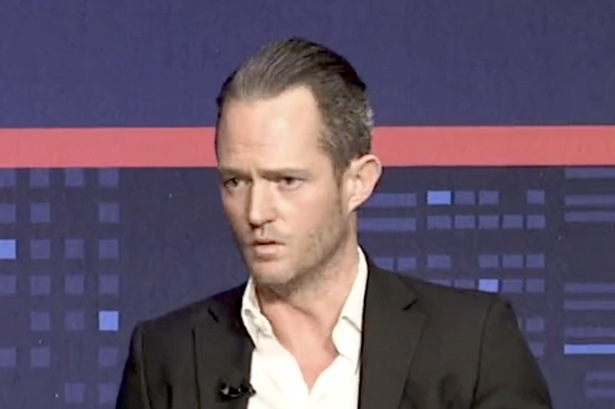Tim Gurner wants you to be miserable. Yes, you.
Speaking at the Australian Financial Review’s “property summit,” the property developer and CEO — net worth $584 million — complained that the country’s 3.7% unemployment rate was, in fact, a problem. “We need to see unemployment rise. Unemployment has to jump 40, 50%,” said Gurner, because “arrogant” workers aren’t productive enough for his liking. “We need to see pain in the economy. We need to remind people that they work for the employer, not the other way around.”
For these words, we should thank Gurner. Not because his theory — that low unemployment and the shift to work from home have hurt productivity — is accurate. Australia’s recent dip in productivity started in mid-2022, well after workers were initially sent home and unemployment recovered from its initial pandemic-induced increase. (Gurner admitted his remarks “were wrong” in a subsequent apology.) No, we should thank him for saying the quiet part out loud, baldly stating what the uber-wealthy think of you and me.
As Georgetown University’s Olúfẹ́mi O. Táíwò wrote, “I can rarely do better at explaining the connection between capital and social-political domination than just pointing at what the guys with the capital do and say.” Though Gurner’s words have gotten unusual exposure on social media, others of his means have expressed similar distaste for the 99%. “The 1% work harder,” said billionaire Sam Zell. “The 1% are much bigger factors in all forms of our society.” According to the Pew Research Center, a majority of the wealthiest Americans believe the “poor have it easy because they can get government benefits without doing anything in return.”
This condescension has consequences not just for employees, but also for consumers. It was no coincidence that as inflation spiked last year, corporations posted record profits. The work of economist Isabella Weber and others has shown that many corporations with market power didn’t raise prices because of supply chain issues or upward pressure on wages but simply because they could. “We have more room to take the price as we need to,” Chipotle’s CEO told investors in late 2021. A Kroger executive bragged that “a little bit of inflation is always good for our business.” Your checkbook is merely another thing to exploit as much as possible in the quest for endless growth to satisfy shareholders. As for the free market? “Competition is for losers,” Peter Thiel is fond of saying.
The wealthy’s arrogance is wholly unearned. In the U.S. from 1978 to 2021, according to the Economic Policy Institute, economic productivity grew more than 60%. Yet the typical worker’s wages — which in previous decades had roughly tracked productivity — grew just 18%. The wages of the top 1% of earners, however, grew 385%. CEO pay grew by more than 1,000%. In some sectors, the disparity is even starker: Union workers at the Big Three American automakers are preparing to strike this week, in part because wages for workers on auto production lines have dropped 30% since 2003. Meanwhile, in just the last four years, pay for the three companies’ CEOs grew more than 40%, with each taking home $21 million to $29 million in 2022 alone.
And yet, when politicians like Sen. Bernie Sanders, Rep. Alexandria Ocasio-Cortez or other, more moderate voices, like former President Barack Obama, point out these truths, they are accused of stoking “class warfare.”
But the rich have been conducting class warfare for decades. Since the 1970s, the wealthy, particularly in the U.S., have been remarkably successful in supporting politicians and policies that widened income gaps. As inequality rose, many governments hollowed out safety nets — except, of course, when banks needed to be bailed out.
Contrary to far-right fantasies like QAnon, this campaign by the elites was no conspiracy. It took place right out in the open, starting with politicians like Ronald Reagan and Margaret Thatcher and running right through the present day. “The Davos elite aren’t eating our children,” Naomi Klein writes in her new book, “but they are eating our children’s futures, and that is plenty bad.”
To hide their undeserved gains, some of the wealthy downplay the helping hands they have received, whether from family (Donald Trump’s referring to $60.7 million as “a small loan from my father”) or the government (Tesla and SpaceX CEO Elon Musk’s criticizing government subsidies even though his companies have received billions from the government).
Mostly, though, they and their political servants (in the U.S., that means especially, but not exclusively, the Republican Party) stoke fights on battlefields small and large. Gurner blames young people’s monetary struggles on avocado toast and overpriced coffee. Major Republican donors like Rebekah Mercer donate millions to conservative media outlets and candidates who stoke fears of culture wars, drag queens and people of color — and who, when they get into office, prioritize tax cuts slanted toward the wealthy.
And some are more brazen. Klein quotes the mid-20th century Belgian leftist Abram Leon’s observation about the Nazis’ use of antisemitic conspiracy theories: “Big business endeavored to divert and control the anti-capitalist hatred of the masses for its exclusive profit.” If that sounds like an extreme comparison, remember that of all the organizations and people who have criticized Musk’s ownership of X (formerly Twitter), he is blaming the collapse in the company’s value on the Anti-Defamation League.
The uber-rich are winning this class war — for now. It doesn’t have to be this way. Like every form of oppression, the wealthy’s exploitation of the rest of the world can be fought — but only if it is called out and united against. They think of us as disposable; it’s up to us to show them they’re wrong.


Spread the word